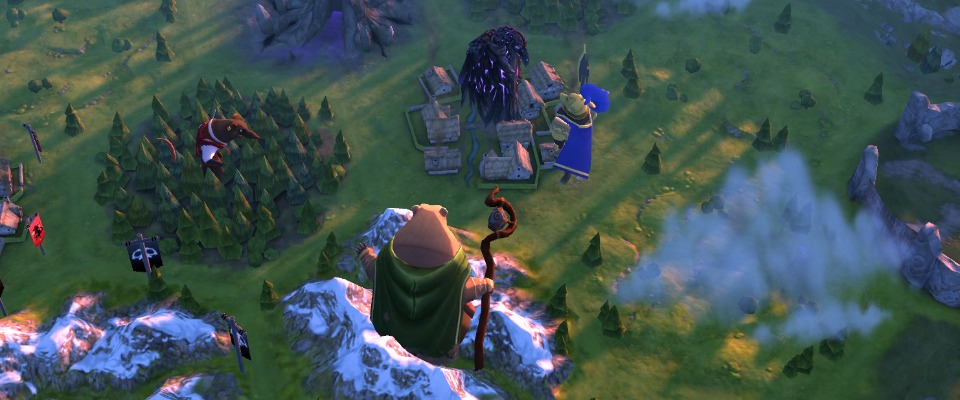With the resurgence of board games in the last decade or so, we have seen some new classics appear on both mobile and consoles, where everything from Settlers of Catan to Carcassonne have been adapted. However while board games themselves are now including tablet supplementary apps, Armello is built from the ground up to be on digital formats. Despite a few teething issues, Armello might be one of the best digital board games available.
Each game begins the same: The King of Armello has been corrupted by the Rot, which is slowly sapping away his life and causes him to make irrational decisions. Players are one of four clans – Wolves, Rabbits, Rats, and Bears – whose task is to usurp the King. Each character has their own relevant perk, but can also bring in unlockable perks to give them a small advantage.
I initially found the beautifully animated creatures in the opening cinematic to be rather reminiscent of the Redwall novels and animated TV series, but the gameplay is structured much more like an adventure orientated Civilization, with hex-based movement.. You have three action points to spend each turn, gain money from the settlements you passed through last, and replenish your Spirit and cards up to a maximum hand size equal to your wit. These values can be increased with spells or through completing quests.
A lot of the game involves wandering to your next quest destination and deciding whether or not it’s worth risking disaster by attempting the sub-challenge. You can also explore ruins and/or tackle the perils other players and the King’s play on their turns. In your way, of course, are the three other players trying to win the throne that you can fight, but the King has a guard that roams the countyside and dark creatures called Banes rise from dungeons during nightfall.
On paper it sounds complex, but the robust tutorial gets you up to speed really quickly. Winning can be done in four ways: A Kingslayer victory requires you to get into the castle and kill the king, while a Corruption win requires you to kill the king while severely corrupted by the rot. Bringing four Spirit Stones into the castle satisfies the Spirit victory condition, while having the most prestige when the King succumbs to the Rot will bag you a Prestige victory.
As a board game, it’s pretty hard to find a fault beyond the random elements, even if some mechanics don’t immediately sink in. Chief among these are the Peril cards which lay down challenges for those that walk into that space. Combine that with the ability to play cards in your hand even during your opponent’s turn and you have a game where fortunes can often turn at a moment’s notice.
Speaking of the cards, you also have access to items to boost your dice rolls during fights and peril tests and spells to enhance your character’s abilities or hinder an opponent directly. On the top right hand corner are symbols that indicate which dice roll the card will give you when you burn it during dice rolls. The key is to know when to keep and when to burn cards and it gives players that work out the game’s mechanics a distinct advantage.
While the concepts of getting stronger, gaining Prestige, and obtaining Spirit Stones are all relatively straightforward, the same can’t be said for Corruption. Certain spells and items can grant a character Rot which will sap their health every dawn, but you can also sacrifice yourself to the Bane to speed up your corruption. This also changes how you interact with spaces on the board, the Bane, and even other players. It’s a great risk-reward strategy if you can pull it off and adds more depth to the game.
Aside from the single player skirmish modes to practice against AI, there is also an online Multiplayer that supports up to four players plus bots, but there is no local multiplayer option as you would be able to see each player’s hands. This is bound to disappoint a few people, myself included, and the game could be slightly retooled to cater for that.
On a purely technical standpoint, there are a couple of glaring issues. Firstly, playing against the AI isn’t as fun, because while the game only lasts a certain amount of turns, the AI takes a disappointingly long time to take their turn. It’s also pretty difficult to read the text on cards and tutorial messages, something that would be alleviated by a larger font size.
What’s Good:
- Sleek overall mechanical design.
- Tutorial gets you up to speed with the mechanics quickly.
- An absolute blast when played with four human players.
- Fantastic concept and theme.
What’s Bad:
- Font size is a tad small.
- AI moves way too slowly.
- Randomness not for everyone.
- No local multiplayer is going to be a deal breaker for some.
The only major things that hold Armello back are things that either can be fixed or are purely subjective. Personally I feel the random element is a little too on the nose, but like all good board games, there are going to be those who really dig that particular feature. Armello’s a fantastic example of a gateway board game and also a great way to spend an hour or two with friends who may not be able to get around a table.
Score: 8/10
Version Tested: PlayStation 4



cam_manutd
Great review and score to boot. Shame it wasn’t the vote to play game of the month-looked infinitely better than the others.
MrYd
The randomness is one of the better features. In particular, some of the options the king gives the prestige leader every day. They can instantly change the whole game, as some of them are quite evil.
They also seem to punish you if you’re ahead on prestige and keep being summoned to the king every day. If you’re on course for an easy prestige victory, it’ll suddenly throw a spanner in the works by giving you a choice that might be bad for you, or shift the balance of prestige towards the other players.
Without the randomness, it’d be too easy. As it is, it can randomly screw up all your tactics and keep things interesting. Never unfair, just “interesting”.
And the music is lovely with Lisa Gerrard warbling away nicely while everything’s going wrong.
Local multiplayer isn’t really an issue. How would that even work without revealing all your secrets to the other players?
Dave Irwin
Randomness is a double edged sword really and for me it was a case that it was perhaps a little too random at times. You can of course mitigate the risk, but if you get a bad roll at the beginning of the game, say a quest is put out of reach, then it becomes difficult to recover.
As for the no local multiplayer, it would have to be a drastically different game if it were to incorporate that feature. Perhaps one way to get around it might be Shareplay on the PS4 version, but that requires the other person to own a PS4.
Pemberton_
Picked this up the other day and I’m really liking it. Nice review!
JR.
This actually sounds pretty good but I’m glad Grow Home won the vote to play. Hated it at first before I adapted to the controls but went on to get 100%. Loved it. Armello would have been my second choice.
Gastos84
I voted for this and now you’ve made me sad that it didn’t win